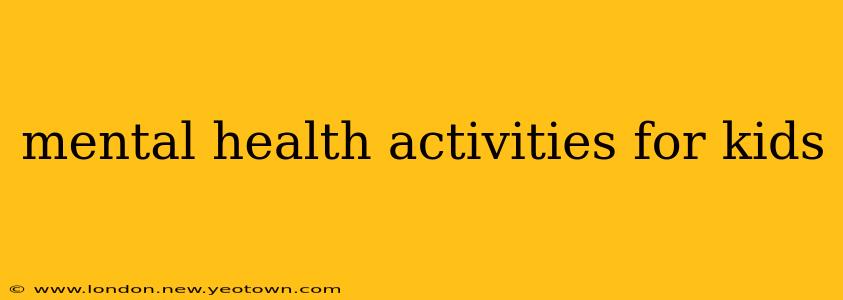It's a jungle out there, even for the smallest among us. Kids face pressures, anxieties, and emotional challenges just like adults, but they often lack the tools to navigate these stormy waters. That's where we, as parents and caregivers, step in. This isn't about fixing everything, but about equipping our children with a toolbox of fun and engaging activities to boost their mental well-being. Think of it as preventative maintenance for their emotional health, a way to build resilience and self-awareness.
What are some fun activities to do with kids to improve their mental health?
This isn't about forcing kids into therapy sessions disguised as fun. Instead, it's about weaving mental health support into their daily lives through enjoyable activities. Think playful ways to manage stress, build self-esteem, and encourage emotional expression.
Let's explore some ideas:
Creative Expression: Unleashing Inner Artists
One of the most powerful ways kids can process their emotions is through creative expression. Art, music, and dance allow them to externalize feelings that might be hard to articulate.
- Art Therapy: Simple drawing, painting, or sculpting can be incredibly therapeutic. There are no rules, no masterpieces to create – just the freedom to express themselves visually. Provide a variety of materials and let their imaginations run wild. Crayons, paint, playdough, even natural materials like leaves and sticks can be used.
- Music Therapy: Singing, playing an instrument, or simply listening to music can be calming and uplifting. Encourage them to create their own songs, or dance to their favourite tunes. Music can tap into deep emotions and provide a healthy outlet.
- Creative Writing: Journalling, poetry, or even storytelling can be a fantastic way to explore thoughts and feelings. Start with simple prompts, like "Describe your favourite day" or "Draw a picture of your feelings." It's about the process, not the perfection of the writing.
Mindfulness and Relaxation Techniques: Finding Inner Peace
Teaching children mindfulness techniques can equip them with vital tools for managing stress and anxiety.
- Mindful Breathing Exercises: Even young children can learn simple breathing exercises. Try blowing bubbles, counting breaths, or focusing on the sensation of air entering and leaving their bodies. These exercises help calm the nervous system.
- Yoga and Stretching: Yoga postures and stretches are a fun way to improve body awareness and reduce stress. Many kid-friendly yoga videos are available online. Focus on the physical sensations and the gentle movements.
- Nature Walks: Spending time in nature is a natural mood booster. A walk in the park, a hike in the woods, or even playing in the backyard can have a calming and restorative effect. Encourage them to notice the sights, sounds, and smells around them.
Physical Activity: The Power of Movement
Physical activity releases endorphins, natural mood boosters that combat stress and anxiety.
- Active Play: Encourage outdoor games, sports, dancing, or simply running around. The goal is to have fun and get their bodies moving.
- Team Sports: Participating in team sports fosters cooperation, communication, and a sense of belonging.
- Individual Sports: Activities like swimming, cycling, or martial arts provide physical challenges and a sense of accomplishment.
Connecting with Others: Building Strong Relationships
Strong social connections are crucial for mental well-being.
- Family Time: Schedule regular family time for games, activities, or simply talking and connecting.
- Social Interactions: Encourage them to spend time with friends, participate in group activities, or join clubs.
- Helping Others: Acts of kindness and helping others boost self-esteem and provide a sense of purpose.
How can I help my child if I notice signs of mental health problems?
Recognizing signs of mental health challenges in children is critical. Changes in behaviour, sleep patterns, appetite, or school performance can be indicators. If you're concerned, seeking professional help from a child psychologist or therapist is essential. Early intervention is key to supporting their well-being.
What are the common mental health issues affecting children?
Children can experience a range of mental health issues, including anxiety disorders, depression, ADHD, and trauma-related disorders. Each condition requires a tailored approach to treatment and support.
What are some resources available for parents seeking help with their child's mental health?
Many resources are available, including online support groups, mental health helplines, and professional organizations dedicated to child mental health. Your pediatrician or family doctor can also provide guidance and referrals.
This is a starting point – a gentle nudge towards enriching your child's mental well-being. Remember, consistency and patience are key. By weaving these activities into your family's routine, you're not just building resilience; you're fostering a deeper connection with your child and building a stronger, happier family.

